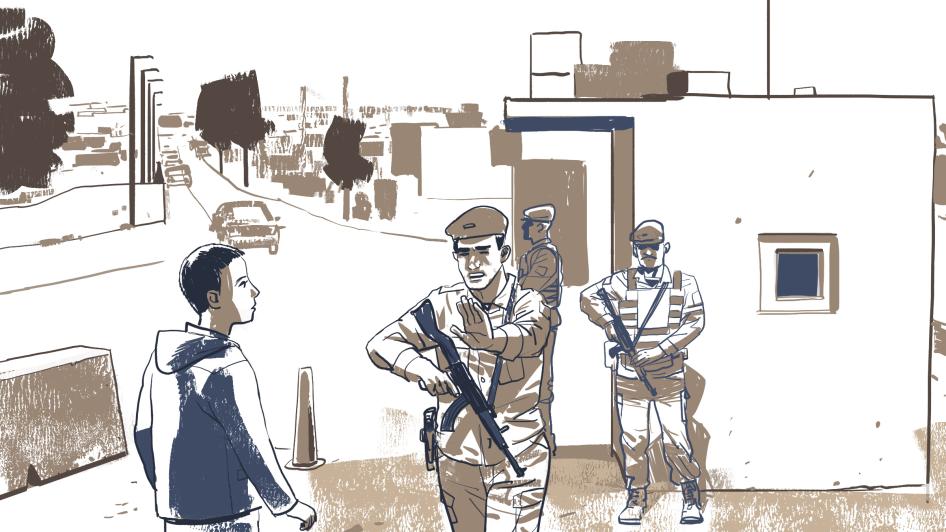(Beirut) – The Iraqi government should immediately reverse the recently passed law that punishes same-sex conduct and transgender expression with imprisonment, Human Rights Watch said today. The law violates fundamental human rights, including the rights to freedom of expression, association, privacy, equality, and nondiscrimination of lesbian, gay, bisexual, and transgender (LGBT) people in Iraq.
On April 27, 2024, Iraq’s parliament passed the anti-LGBT law as an amendment to the country’s existing “Law on Combatting Prostitution,” No. 8 of 1988. The new law punishes same-sex relations with a penalty of between 10 and 15 years in prison as well as allowing for a prison term between 1 and 3 years for people who undergo or perform gender-affirming medical interventions and for “imitating women.” The law also provides for 7 years in prison and a fine between 10 million Iraqi dinars (US$7,700) and 15 million dinars (US$11,500) for “promoting homosexuality,” which is undefined.
“The Iraqi parliament’s passage of the anti-LGBT law rubber-stamps the Iraqi government’s appalling record of rights violations against LGBT people and is a serious blow to fundamental human rights,” said Rasha Younes, interim LGBT rights director at Human Rights Watch. “The law adds insult to injury for LGBT people in Iraq, who are already facing violence and threats to their lives.”
Though consensual same-sex conduct was not previously explicitly criminalized in Iraq, the authorities have historically used vague “morality” laws to prosecute LGBT people. The introduction of the anti-LGBT law follows months of hostile rhetoric against sexual and gender minorities by Iraqi officials, as well as government crackdowns on human rights groups. Previous proposed amendments to the anti-prostitution law would have imposed the death penalty for same-sex relations, but this provision did not appear in the final version.
The new law, which Human Rights Watch reviewed, equates same-sex relations with “sexual perversion,” which it defines as “repeated sexual relations between members of the same sex … if occurring more than three times.”
The new law also specifically targets transgender women. It allows for a prison term between one and three years or with a fine between 5 million dinars (US$3,800) and 10 million dinars (US$7,700) for “imitating women,” which it defines as “wearing makeup and women’s clothing” or “appearing as women” in public spaces.
The law prohibits hormone therapy and what it calls “sex change” based on personal desire, as well as any attempt to change one’s gender identity, punishable by prison terms between one and three years. The same penalty applies to any surgeon or other doctor who performs gender-affirming surgery. The law makes an exception for cases of people born with intersex traits, when a surgeon is performing an operation to “normalize” the sex characteristics into classical male or female aesthetics.
Iraq’s new anti-LGBT law builds on and reflects an increasing effort by anti-LGBT legislators to explicitly make same-sex relations and transgender expression a criminal offense. The immediate precursor to the law passed in April was a bill introduced on August 15, 2023, by Raad Al-Maliki, an independent member of parliament.
If passed in its original form, the bill would have punished same-sex relations with the death penalty or life in prison, punished “promoting homosexuality” with a minimum of seven years in prison and a fine, and criminalized “imitating women” with up to a three-year sentence. In introducing the bill, Al-Maliki said its purpose was to “preserve the entity of the Iraqi society from deviation and calls for ‘paraphilia’ [abnormal sexual impulses] that have invaded the world.”
The introduction of the 2023 bill in turn followed a proposed anti-LGBT law put forward by legislators in the Kurdistan Region of Iraq. In September 2022, members of the Kurdistan Regional Parliament introduced the “Bill on the Prohibition of Promoting Homosexuality.” Under the bill, anyone who advocates for LGBT rights or “promotes homosexuality” would face up to a year in prison and a fine of up to five million dinars (US$3,430). The bill would also suspend, for up to one month, the licenses of media companies and civil society organizations that “promote homosexuality.”
Although the bill was not passed, it was introduced amid a heightened crackdown on free assembly and expression in the Kurdistan region. On May 31, 2023, a court in the region ordered the closure of Rasan Organization over “its activities in the field of homosexuality.”
Violence and discrimination against LGBT people are already rampant in Iraq. The targeting of LGBT people online and lethal violence against LGBT people by armed groups in Iraq has routinely been met with impunity, Human Rights Watch said.
On August 8, 2023, the Iraqi Communications and Media Commission issued a directive ordering all media outlets to replace the term “homosexuality” with “sexual deviance” in their published and broadcast language and banning use of the term “gender.”
Iraqi authorities’ continued attacks against LGBT people and activists violate their basic rights, including their right to privacy, free movement, free expression, assembly, and association, including on the internet, as well as their right to nondiscrimination and protection under the law. The abuses violate Iraq’s Constitution and international treaties to which Iraq is a party.
Unequal protection against violence and unequal access to justice are prohibited under international law. The International Covenant on Civil and Political Rights, in its articles 2 and 26, guarantees fundamental human rights and equal protection of the law without discrimination. The United Nations Human Rights Committee, the international expert body that provides authoritative interpretations of the covenant, has made clear that sexual orientation is a status protected against discrimination under these provisions. Similarly, the Arab Charter on Human Rights, of which Iraq is a member, affirms these rights.
“Relentless abuses against LGBT people in Iraq, starting with the family and stretching into every aspect of their public life, not only results in the deaths but makes people’s lives unlivable,” Younes said. “The Iraqi government should immediately repeal the anti-LGBT law and end the cycle of violence and impunity against LGBT people.”








